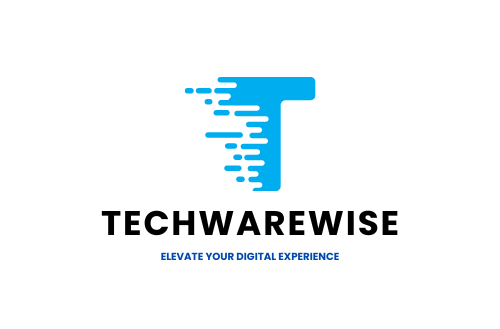Selecting the right project management tool is a critical decision that directly impacts your team’s productivity and your company’s bottom line. With numerous options available, business leaders must evaluate not just features and pricing, but the overall return on investment (ROI) each solution provides. This comprehensive comparison of Asana, Monday.com, and ClickUp will help you determine which project management tool delivers the best value for your specific business needs.
Key Criteria for Comparing Project Management ROI
When evaluating the ROI of project management tools like Asana vs Monday vs ClickUp, it’s essential to consider multiple factors beyond just the upfront subscription cost. The true value comes from how these tools impact your team’s efficiency, collaboration capabilities, and overall project delivery.
Quantitative ROI Factors
- Initial implementation costs
- Ongoing subscription fees
- Time saved on administrative tasks
- Reduction in missed deadlines
- Improved resource allocation
- Integration with existing tools
Qualitative ROI Factors
- Ease of adoption and learning curve
- Team collaboration improvements
- Visibility into project progress
- Customization flexibility
- Mobile accessibility
- Customer support quality
Our analysis will examine each tool through these lenses to provide a comprehensive understanding of their value proposition. We’ll break down pricing structures, core functionality, user experience, and long-term scalability to help you make an informed decision.

Pricing and Scalability Comparison
Understanding the pricing structure of each project management tool is crucial for calculating potential ROI. Let’s examine how Asana, Monday.com, and ClickUp compare in terms of cost and scalability for growing businesses.
| Feature | Asana | Monday.com | ClickUp |
| Free Plan | Up to 10 users | Up to 2 users | Unlimited users |
| Entry Paid Plan | $10.99 per user/month | $9 per user/month | $7 per user/month |
| Mid-tier Plan | $24.99 per user/month | $12 per user/month | $12 per user/month |
| Enterprise Plan | Custom pricing | Custom pricing | Custom pricing |
| Storage (Entry Plan) | Unlimited | 5GB | Unlimited |
| Automation Limits | Unlimited on Business plan | 250/month on Standard, 25,000/month on Pro | 1,000/month on Unlimited, 10,000/month on Business |
Cost Analysis Insights
Asana
Asana offers the most generous free plan user limit (10 users), making it attractive for small teams. However, its paid plans are the most expensive of the three, with a significant jump from the Starter ($10.99) to the Business plan ($24.99).
For a team of 20 users on the mid-tier plan, Asana would cost approximately $6,000 annually.
Monday.com
Monday.com provides a balanced pricing structure with more gradual increases between tiers. Its Standard plan ($12) offers good value compared to Asana’s equivalent, though the free plan is limited to just 2 users.
For a team of 20 users on the Standard plan, Monday.com would cost approximately $2,880 annually.
ClickUp
ClickUp stands out with the most cost-effective pricing across all tiers. Its Unlimited plan ($7) is significantly cheaper than competitors while still offering robust features. The free plan supports unlimited users with some limitations.
For a team of 20 users on the Unlimited plan, ClickUp would cost approximately $1,680 annually.
Ready to compare pricing for your team?
Get personalized quotes based on your team size and specific requirements.

Core Features and Functionality Comparison
The value of a project management tool is largely determined by how well its features address your team’s specific needs. Let’s examine how Asana, Monday.com, and ClickUp compare across key functionality areas.
Task Management Capabilities
| Feature | Asana | Monday.com | ClickUp |
| Task Views | List, Board, Timeline, Calendar | Main Table, Kanban, Timeline, Calendar, Chart | List, Board, Calendar, Gantt, Timeline, Mind Map |
| Subtasks | Yes, with limitations | Yes | Yes, unlimited nesting |
| Task Dependencies | Yes (Premium+) | Yes (Standard+) | Yes (Free+) |
| Time Tracking | Via integrations | Native (Pro+) | Native (Free+) |
| Task Templates | Yes | Yes | Yes, extensive library |
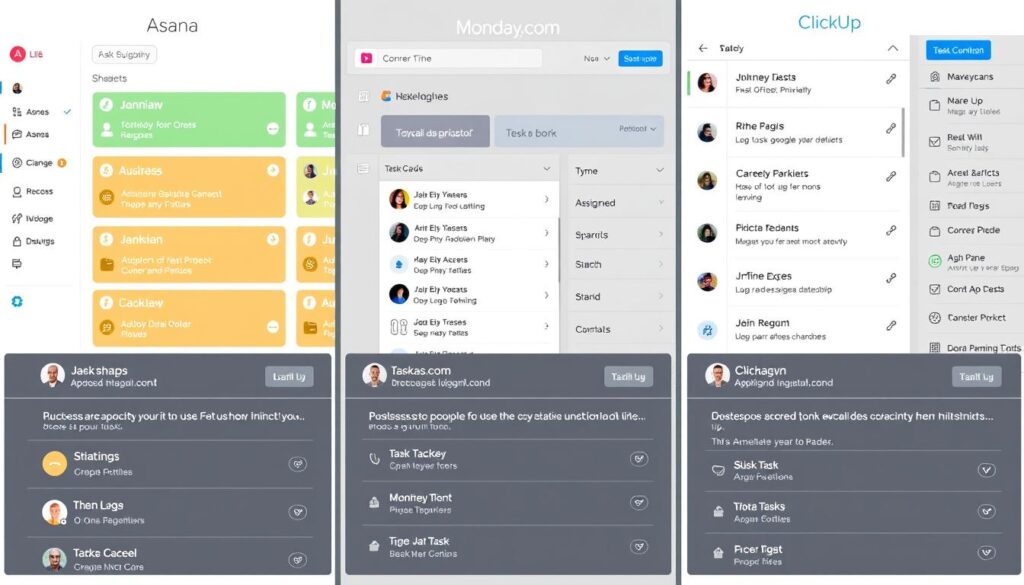
Collaboration and Communication Tools
| Feature | Asana | Monday.com | ClickUp |
| Comments & Mentions | Yes | Yes | Yes |
| File Sharing | Yes | Yes | Yes |
| Real-time Collaboration | Limited | Yes | Yes, with Docs |
| Chat/Messaging | Task comments only | Project message boards | Chat view |
| Whiteboard | No | Yes | Yes |
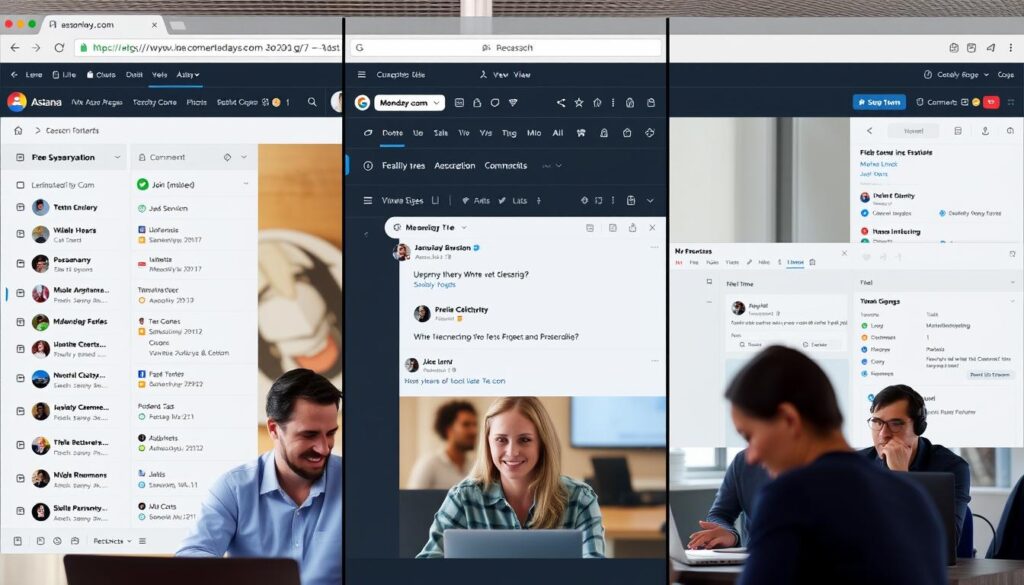
Automation and Workflow Capabilities
| Feature | Asana | Monday.com | ClickUp |
| Custom Automations | Yes (Business+) | Yes (Standard+) | Yes (Unlimited+) |
| Workflow Templates | Yes | Yes | Yes, extensive library |
| Form Builder | Yes (Premium+) | Yes (Standard+) | Yes (Free+) |
| Approval Workflows | Yes (Business+) | Yes (Pro+) | Yes (Business+) |
| AI Assistance | Limited | Yes (beta) | Yes (ClickUp Brain) |
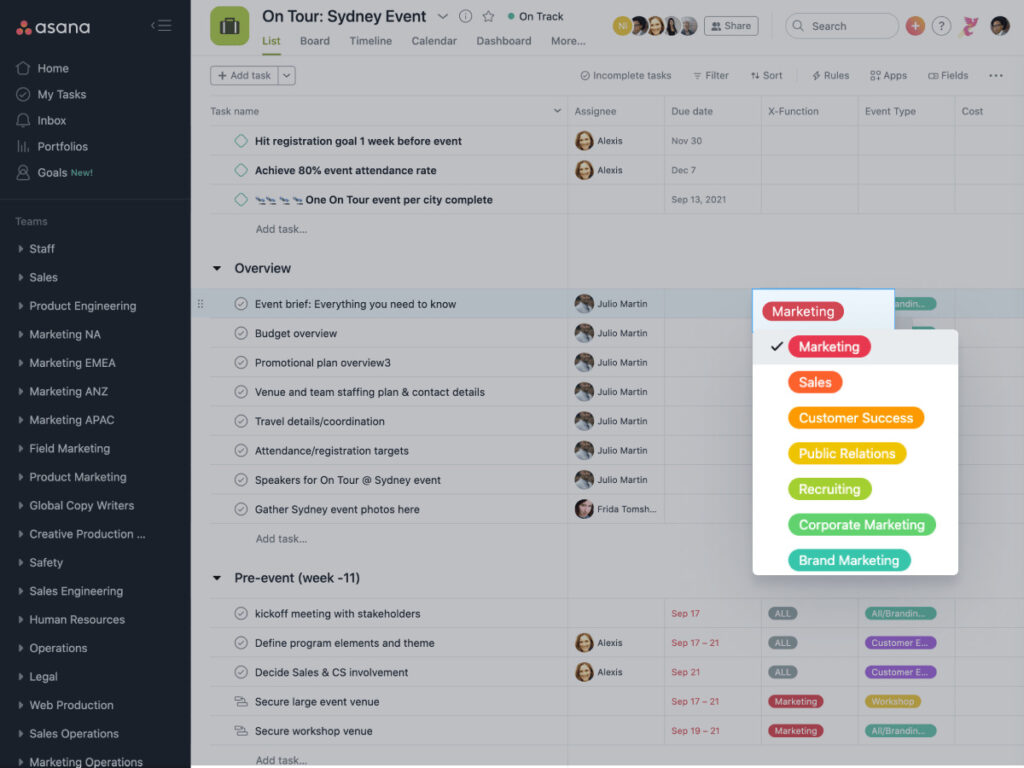
Integration Ecosystem
| Feature | Asana | Monday.com | ClickUp |
| Total Integrations | 200+ | 200+ | 1,000+ |
| Key Integrations | Slack, Google Workspace, Microsoft Teams, Zoom | Slack, Google Drive, Zoom, Microsoft Teams | Slack, Google Drive, Dropbox, GitHub |
| API Access | Yes | Yes | Yes |
| Zapier | Yes | Yes | Yes |
| Free Plan Integrations | Limited | None | Limited |
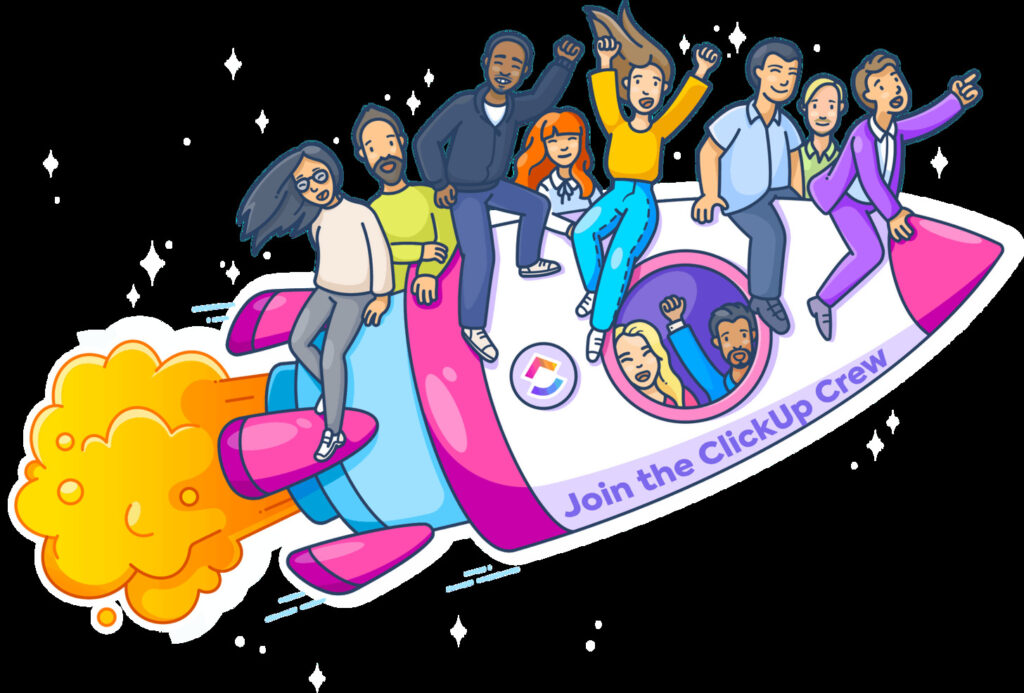
Find the right features for your team
Try these platforms free and experience their features firsthand.
User Experience and Learning Curve
The ease of adoption and overall user experience significantly impact the ROI of any project management tool. A platform that’s intuitive and easy to learn will lead to faster implementation and higher team adoption rates.
Asana
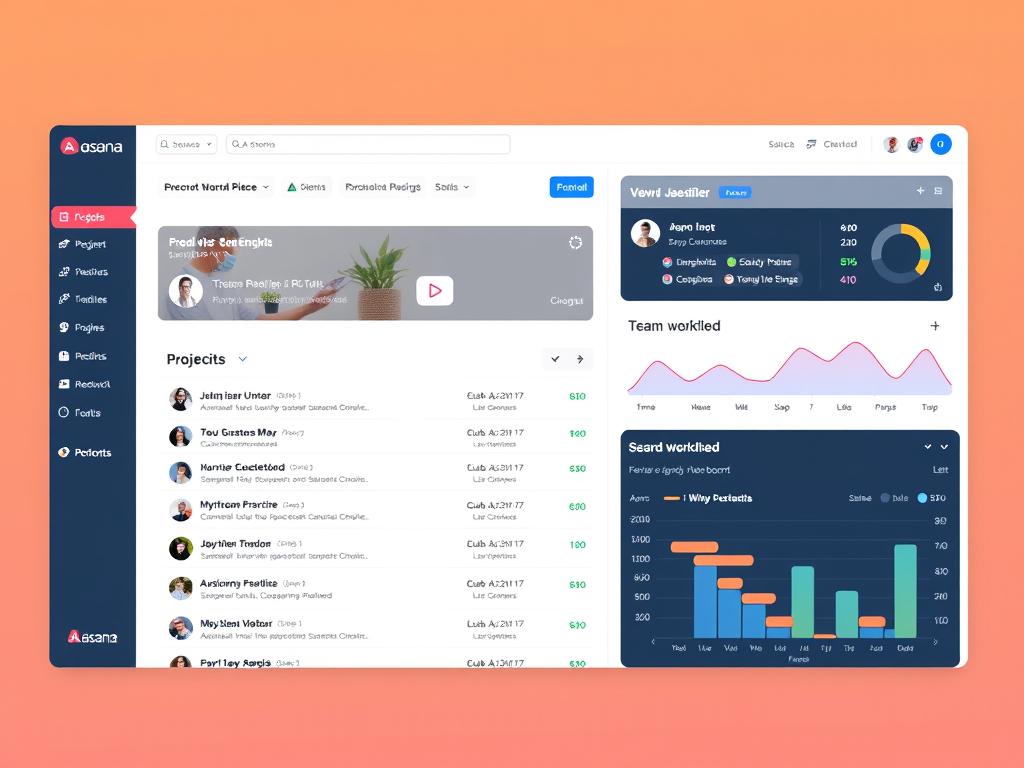
User Interface
Asana offers a clean, minimalist interface that’s visually appealing and relatively easy to navigate. The layout is logical, with a sidebar for navigation and a main workspace for viewing and managing tasks.
Learning Curve
Asana has a moderate learning curve. Basic task management is straightforward, but mastering advanced features like dependencies, custom fields, and rules requires time and training.
Mobile Experience
Asana’s mobile app provides a good experience for on-the-go task management, though some advanced features are better accessed via desktop.
Monday.com
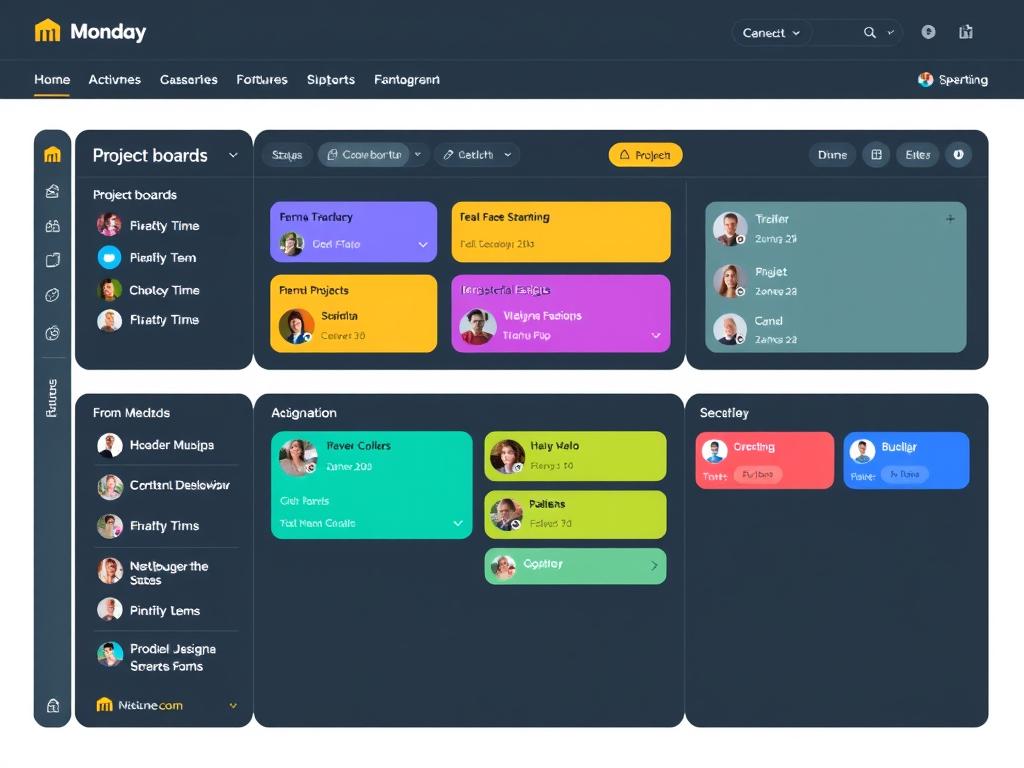
User Interface
Monday.com features a colorful, visually engaging interface with an emphasis on visual status indicators. The platform uses color coding extensively to show task status and priority at a glance.
Learning Curve
Monday.com is highly intuitive with one of the friendliest interfaces for beginners. New users can quickly grasp the basics, though the extensive customization options can be overwhelming initially.
Mobile Experience
The Monday.com mobile app offers a robust experience that closely mirrors the desktop version, making it excellent for teams that need full functionality on mobile devices.
ClickUp
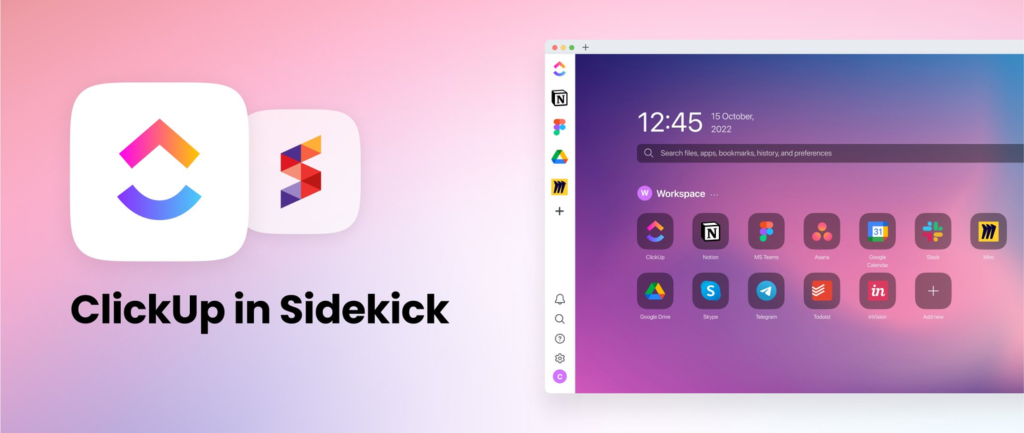
User Interface
ClickUp offers a feature-rich interface with multiple views and extensive customization options. The UI is modern and clean, though it can appear busy due to the sheer number of features available.
Learning Curve
ClickUp has the steepest learning curve of the three tools due to its extensive feature set. New users may feel overwhelmed initially, but the platform offers excellent onboarding resources.
Mobile Experience
ClickUp’s mobile app provides access to most features, though the experience is somewhat condensed compared to the desktop version due to the platform’s complexity.
Customization and Flexibility
Asana Customization
- Custom fields for tailored data collection
- Project templates for consistent workflows
- Rules for automating routine tasks
- Forms for standardized data entry
- Limited visual customization options
Monday.com Customization
- Highly flexible column types
- Visual customization with colors and icons
- Custom automations and integrations
- Dashboard widgets for data visualization
- Can become visually cluttered with excessive customization
ClickUp Customization
- Unmatched customization options
- Custom fields, statuses, and relationships
- Multiple view types for different work styles
- Spaces, folders, and lists for organization
- Can be overwhelming without proper planning
Implementation Considerations
- More customization options require more setup time
- Team training needs increase with complexity
- Consistent usage policies are essential
- Consider phased implementation for complex tools
- Balance customization with simplicity for adoption

ROI Analysis: Time Savings and Productivity Gains
The true value of a project management tool comes from how it impacts your team’s productivity and efficiency. Let’s analyze the potential ROI each platform can deliver based on time savings, productivity improvements, and overall business impact.
Implementation and Onboarding Time
| Factor | Asana | Monday.com | ClickUp |
| Initial Setup Time | Medium (2-3 weeks) | Low (1-2 weeks) | High (3-4 weeks) |
| User Training Required | Moderate | Low | High |
| Template Availability | Good | Excellent | Excellent |
| Onboarding Resources | Comprehensive | Good | Extensive |

Productivity Impact Analysis
Asana Productivity Impact
- Time Savings: 15-20% reduction in time spent on task management
- Meeting Reduction: 30% fewer status update meetings
- Email Reduction: 25% decrease in project-related emails
- Deadline Improvement: 20% increase in on-time project delivery
Asana’s strength lies in its clean interface and focus on core project management functionality. Teams report significant reductions in administrative overhead and improved project visibility.
Monday.com Productivity Impact
- Time Savings: 20-25% reduction in time spent on task management
- Meeting Reduction: 35% fewer status update meetings
- Email Reduction: 30% decrease in project-related emails
- Deadline Improvement: 25% increase in on-time project delivery
Monday.com’s visual approach and intuitive interface lead to rapid adoption and significant productivity gains. Teams particularly value the visual status updates and collaborative features.
ClickUp Productivity Impact
- Time Savings: 25-30% reduction in time spent on task management
- Meeting Reduction: 40% fewer status update meetings
- Email Reduction: 35% decrease in project-related emails
- Deadline Improvement: 30% increase in on-time project delivery
ClickUp offers the highest potential productivity gains due to its comprehensive feature set and extensive automation capabilities. However, these benefits are only fully realized after complete implementation and training.
Long-term ROI Calculation
To calculate the potential ROI for your organization, consider this formula:
ROI = (Productivity Gains + Time Savings – Total Cost) / Total Cost × 100%
Where:
- Productivity Gains: Value of increased output and improved quality
- Time Savings: Value of reduced administrative time
- Total Cost: Subscription fees + implementation costs + training time
| Factor (20-person team) | Asana | Monday.com | ClickUp |
| Annual Subscription Cost | $6,000 (Business) | $2,880 (Standard) | $1,680 (Unlimited) |
| Implementation Cost | $4,000 | $2,500 | $5,000 |
| Time Savings Value | $30,000 | $35,000 | $40,000 |
| Productivity Gains Value | $25,000 | $30,000 | $35,000 |
| First-Year ROI | 450% | 1,157% | 1,025% |
These calculations are estimates based on industry averages and will vary depending on your specific team composition, hourly rates, and implementation approach. However, they illustrate the significant ROI potential of all three platforms, with Monday.com and ClickUp offering particularly strong returns due to their lower initial costs.
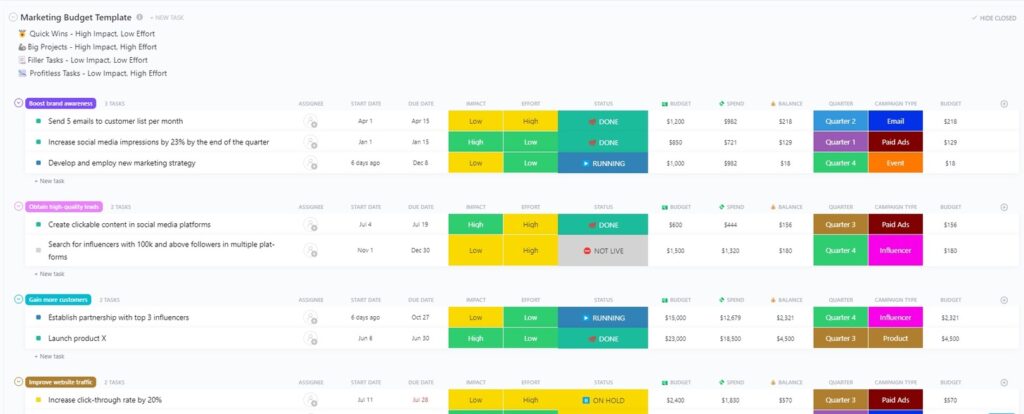
Calculate your potential ROI
Try ClickUp free and see how much time and money your team could save.
Tool Breakdown: Asana
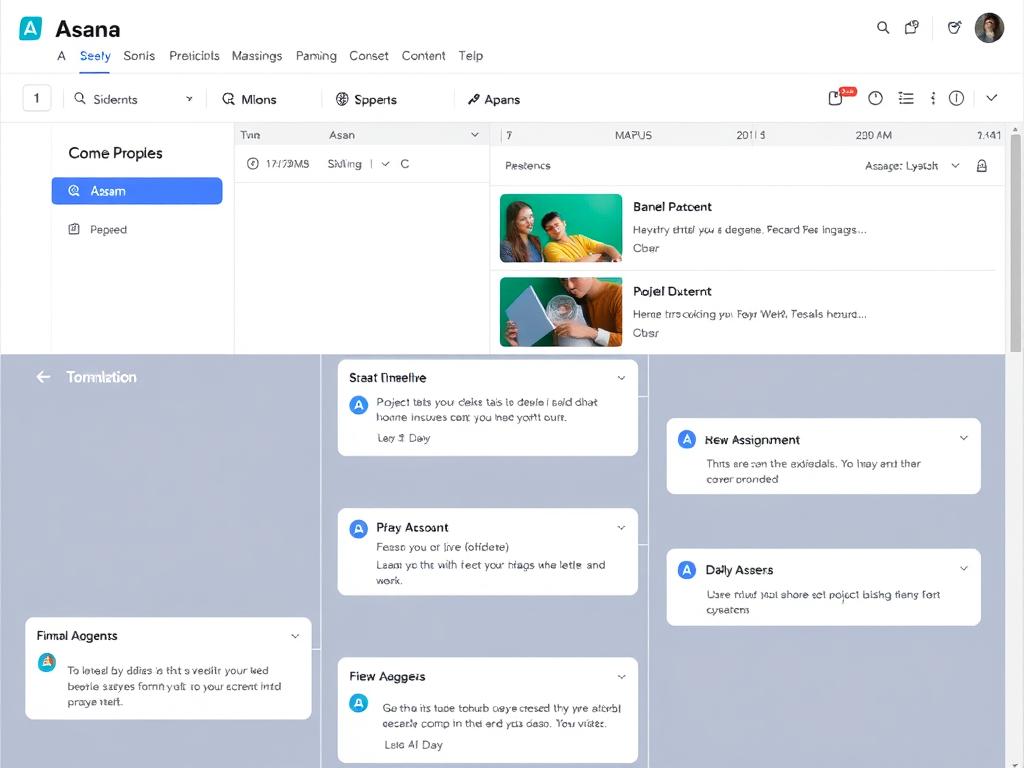
Asana Overview
Asana is a well-established project management platform known for its clean interface and robust task management capabilities. Founded in 2008 by former Facebook executives, Asana has evolved into a comprehensive work management solution used by teams of all sizes.
Asana Strengths
- Clean, intuitive interface that’s easy to navigate
- Excellent task management with multiple view options
- Robust integration ecosystem (200+ integrations)
- Strong reporting and progress tracking features
- Generous free plan for up to 10 users
- Excellent security measures with information backed up and secured by firewall
Asana Limitations
- Higher pricing compared to competitors
- Tasks can only be assigned to one team member
- Limited customization options compared to alternatives
- Some advanced features only available on higher-tier plans
- Can become cluttered with complex projects
- Steeper learning curve for advanced features
Ideal Use Cases for Asana
Marketing Teams
Asana excels at managing marketing campaigns with its timeline view and integration with creative tools. Marketing teams can easily track campaign progress, manage content calendars, and coordinate cross-functional efforts.
Mid-sized Organizations
Organizations with 10-100 employees often find Asana’s balance of features and usability ideal. The platform scales well for growing teams while maintaining ease of use and providing necessary oversight.
Process-Oriented Teams
Teams with established workflows and processes benefit from Asana’s structured approach to project management. The platform’s rules and automation features help enforce consistent processes.
“Asana has transformed how our marketing team collaborates. The timeline view gives us perfect visibility into our campaign schedules, and the integrations with our creative tools have eliminated countless hours of manual updates.”
Experience Asana’s intuitive interface
Start with Asana’s free plan for teams up to 10 people.
Tool Breakdown: Monday.com
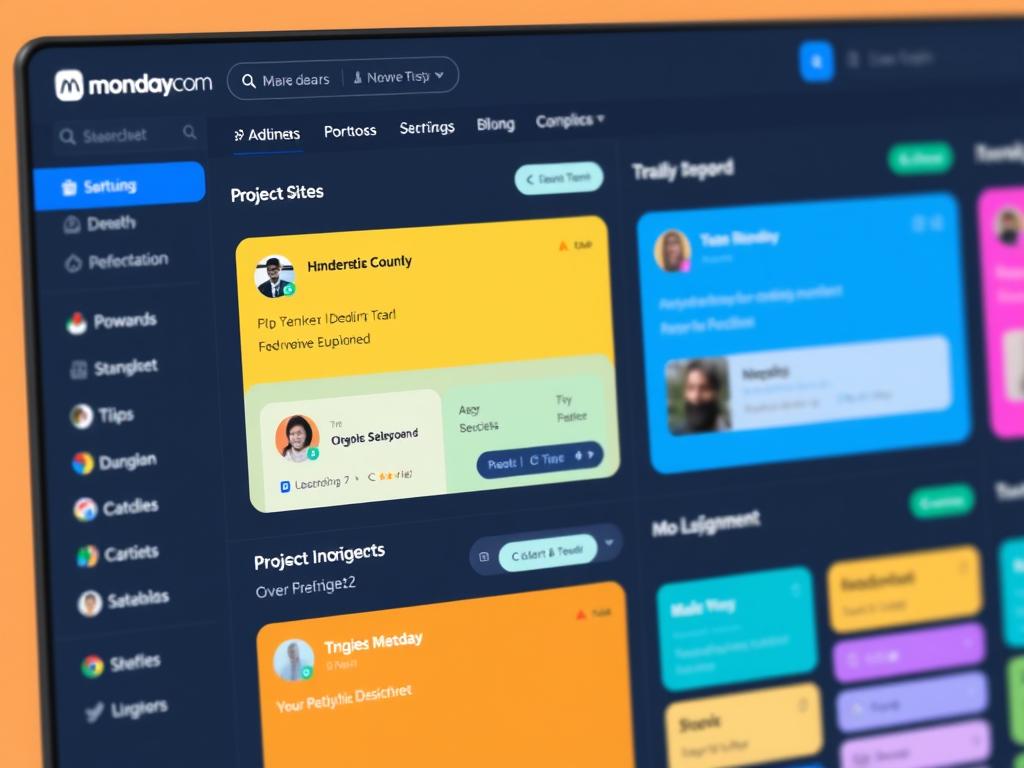
Monday.com Overview
Monday.com (formerly dapulse) is a visual work management platform designed to help teams plan, track, and deliver projects efficiently. Known for its colorful, intuitive interface, Monday.com has gained popularity for making project management more accessible and engaging.
Monday.com Strengths
- Highly intuitive, user-friendly interface
- Excellent visual workflow management
- Strong customization capabilities
- Superior data visualization tools
- Robust collaboration features
- 24/7 live support for Enterprise users
Monday.com Limitations
- Limited free plan (only 2 users)
- No integrations on free or Basic plans
- Automation limits on lower-tier plans
- Can become visually cluttered with many projects
- Performance can lag with large boards
- Customization options can be overwhelming
Ideal Use Cases for Monday.com
Creative Teams
Monday.com’s visual approach makes it perfect for creative teams who benefit from seeing project status at a glance. The platform’s colorful interface and visual indicators help creative professionals track projects without getting bogged down in details.
Client-Facing Teams
Teams that need to share progress with clients benefit from Monday.com’s visually appealing interface and guest access features. The platform makes it easy to create professional-looking dashboards that can be shared externally.
Cross-Functional Teams
Teams with members from different departments appreciate Monday.com’s flexibility and customization options. The platform can be adapted to suit various work styles and departmental needs while maintaining centralized visibility.
“Monday.com revolutionized our agency’s project management. The visual boards make it easy for our designers, developers, and account managers to collaborate, and clients love the transparency they get through the shared dashboards.”
Experience Monday.com’s visual workflow management
Start with a 14-day free trial, no credit card required.
Tool Breakdown: ClickUp
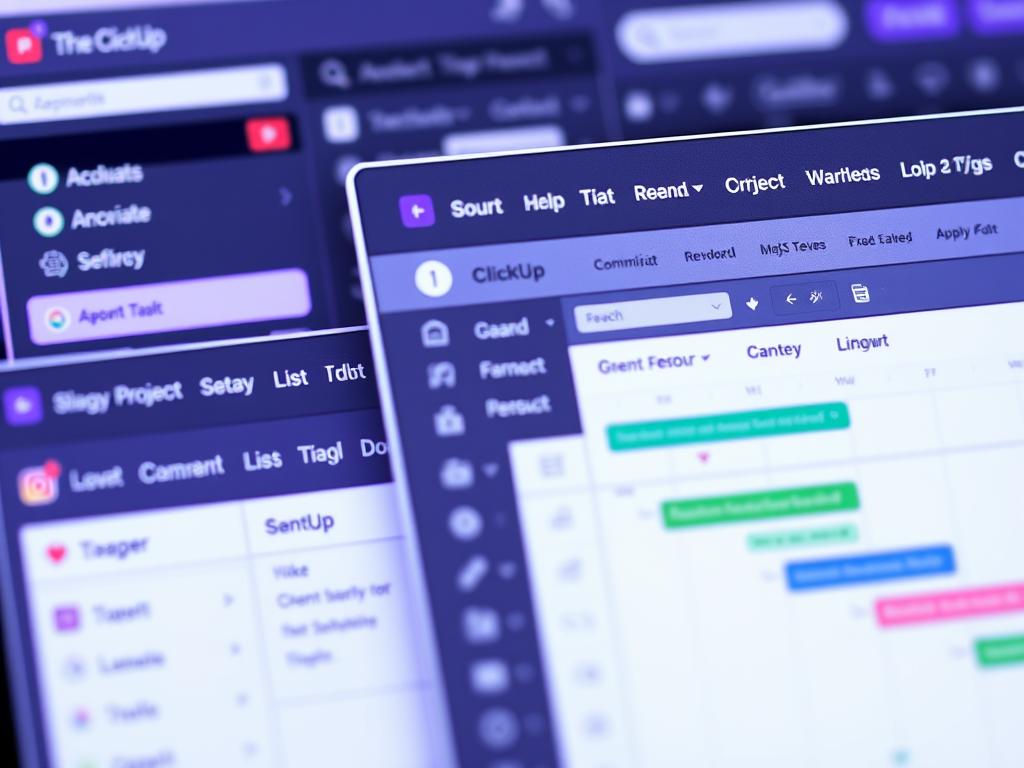
ClickUp Overview
ClickUp is a comprehensive productivity platform that aims to replace multiple work tools with one unified solution. Launched in 2017, ClickUp has quickly gained popularity for its extensive feature set, flexibility, and competitive pricing.
ClickUp Strengths
- Comprehensive feature set that can replace multiple tools
- Excellent value for money with competitive pricing
- Generous free plan with unlimited users
- Extensive customization options
- Multiple view types for different work styles
- Native time tracking on all plans
ClickUp Limitations
- Steeper learning curve due to feature complexity
- Can feel overwhelming for simple projects
- Interface can be busy and cluttered
- Occasional performance issues with large projects
- Mobile app has some limitations
- Some users report occasional bugs
Ideal Use Cases for ClickUp
Tech Teams
ClickUp’s extensive feature set and flexibility make it ideal for technical teams who need to manage complex projects. Software development teams appreciate the platform’s customization options and integration with development tools.
Budget-Conscious Organizations
Organizations looking to maximize value will appreciate ClickUp’s competitive pricing and comprehensive feature set. The platform offers enterprise-level capabilities at a fraction of the cost of many competitors.
All-in-One Seekers
Teams looking to consolidate multiple tools into one platform find ClickUp’s comprehensive approach appealing. The platform can replace task management, documentation, goal tracking, and time management tools.
“ClickUp has been a game-changer for our development team. We’ve been able to replace three separate tools with just ClickUp, saving us thousands annually while improving our workflow. The learning curve was worth it for the long-term productivity gains.”
Experience ClickUp’s all-in-one platform
Start with ClickUp’s feature-rich free plan.
Final Recommendation: Which Tool Delivers the Best ROI?
After thoroughly comparing Asana vs Monday vs ClickUp across pricing, features, user experience, and potential ROI, it’s clear that each platform offers distinct advantages for different types of organizations. Here’s our recommendation based on specific business scenarios:
- Winner: ClickUp
- Generous free plan with unlimited users
- Comprehensive feature set at lowest price point
- Excellent value as team grows
- Native time tracking without additional cost
- ROI advantage: Lowest total cost of ownership
Best for Small Teams (1-10 users)
- Winner: Monday.com
- Intuitive interface minimizes training time
- Balanced feature set and customization
- Strong visual management capabilities
- Excellent collaboration features
- ROI advantage: Fastest implementation and adoption
Best for Mid-sized Teams (10-50 users)
- Winner: Asana
- Robust security and compliance features
- Enterprise-grade administration controls
- Extensive integration ecosystem
- Proven scalability for large organizations
- ROI advantage: Enterprise-ready infrastructure
Best for Enterprise (50+ users)
Industry-Specific Recommendations
Creative Industries

Recommended: Monday.com
Creative teams benefit from Monday.com’s visual approach and intuitive interface. The platform’s colorful status indicators and customizable workflows align well with creative processes, while its collaboration features facilitate feedback and approvals.
Software Development

Recommended: ClickUp
Development teams appreciate ClickUp’s flexibility and comprehensive feature set. The platform’s multiple views, custom fields, and extensive integrations with development tools make it ideal for managing complex software projects and agile workflows.
Marketing & Agencies

Recommended: Asana
Marketing teams and agencies benefit from Asana’s structured approach and timeline views. The platform excels at managing campaign calendars, content production workflows, and cross-functional collaboration, with strong reporting for client updates.
ROI Maximization Tips
Implementation Best Practices
- Start with a pilot team before full organization rollout
- Invest in proper training for all team members
- Customize the tool to match your existing workflows
- Develop clear usage guidelines and standards
- Regularly review and optimize your setup
Long-term Value Optimization
- Leverage automation to eliminate repetitive tasks
- Integrate with your existing tech stack
- Regularly audit and clean up unused projects
- Stay updated on new features and capabilities
- Collect team feedback and adjust accordingly
Pro Tip: Most project management tools offer significant discounts for annual billing versus monthly payments. For example, ClickUp offers a 45% discount for annual subscriptions, substantially improving your ROI calculations.

Find your perfect project management solution
Try all three platforms free and experience their features firsthand.
Frequently Asked Questions
Which project management tool is the most cost-effective?
ClickUp offers the most cost-effective pricing structure among the three platforms, with its Unlimited plan starting at just $7 per user per month. This plan includes most essential features that would require higher-tier plans on Asana or Monday.com. For small teams on a tight budget, ClickUp’s free plan is also exceptionally generous, offering unlimited users and tasks.
Which platform has the easiest learning curve?
Monday.com offers the most intuitive user experience and shortest learning curve among the three platforms. Its visual interface and straightforward navigation make it accessible to team members with varying technical abilities. Asana follows with a clean interface that’s relatively easy to learn, while ClickUp has the steepest learning curve due to its extensive feature set.
Can I migrate data between these platforms?
Yes, all three platforms offer data migration capabilities:
- ClickUp has built-in importers for Asana, Monday.com, Trello, and several other tools
- Monday.com offers native importers for Asana, Trello, and Excel/CSV files
- Asana allows imports from Trello, Wrike, and CSV files
For more complex migrations, third-party tools like Zapier can help transfer data between platforms.
Which platform offers the best mobile experience?
Monday.com offers the best mobile experience among the three platforms, with a robust mobile app that closely mirrors the desktop functionality. Asana’s mobile app is also well-designed and provides good access to core features. ClickUp’s mobile app, while functional, can feel somewhat limited compared to its feature-rich desktop version due to the platform’s complexity.
How do these tools handle time tracking?
ClickUp offers native time tracking on all plans, including its free plan. Users can track time directly within tasks and generate reports on time usage.
Monday.com includes native time tracking on its Pro plan and above, with the ability to assign billing amounts to employees’ time.
Asana has recently added time tracking capabilities, allowing users to add estimated and actual time fields to templates and sub-tasks, but lacks some of the more advanced time billing features found in Monday.com.
Conclusion: Making Your Final Decision
When comparing Asana vs Monday vs ClickUp for the best ROI, there’s no one-size-fits-all answer. The right choice depends on your organization’s specific needs, team size, budget, and workflow requirements.
ClickUp offers exceptional value with its comprehensive feature set and competitive pricing, making it ideal for budget-conscious teams and those looking to consolidate multiple tools. Monday.com provides the most intuitive user experience and visual workflow management, perfect for teams prioritizing quick adoption and collaboration. Asana delivers a polished, enterprise-ready solution with excellent integrations and security features, suited for larger organizations with complex requirements.
To maximize your ROI, consider starting with a free trial of each platform to evaluate how they align with your team’s specific workflows and requirements. Pay particular attention to user adoption, as even the most feature-rich platform will deliver poor ROI if your team struggles to use it effectively.
Ultimately, the project management tool that delivers the best ROI is the one that your team will actually use consistently while providing the specific features you need at a price point that makes sense for your budget.
Ready to boost your team’s productivity?
Start with a free trial of our top recommendation based on overall value.
Affiliate Disclosure
This website/blog/content contains affiliate links. This means if you click on one of these links and make a purchase, I may receive a small commission at no additional cost to you.
I only recommend products and services that I genuinely believe in and have personally used or thoroughly researched. While I do receive compensation for these recommendations, my opinions remain honest and unbiased.
The commissions earned help support this website and allow me to continue providing valuable content. I appreciate your support when you use these links, but you are never obligated to make purchases through them.
Please note that prices of products or services may vary, and I have no control over these prices or the availability of items. All recommendations are made based on my assessment at the time of posting.
Thank you for your understanding and support.
